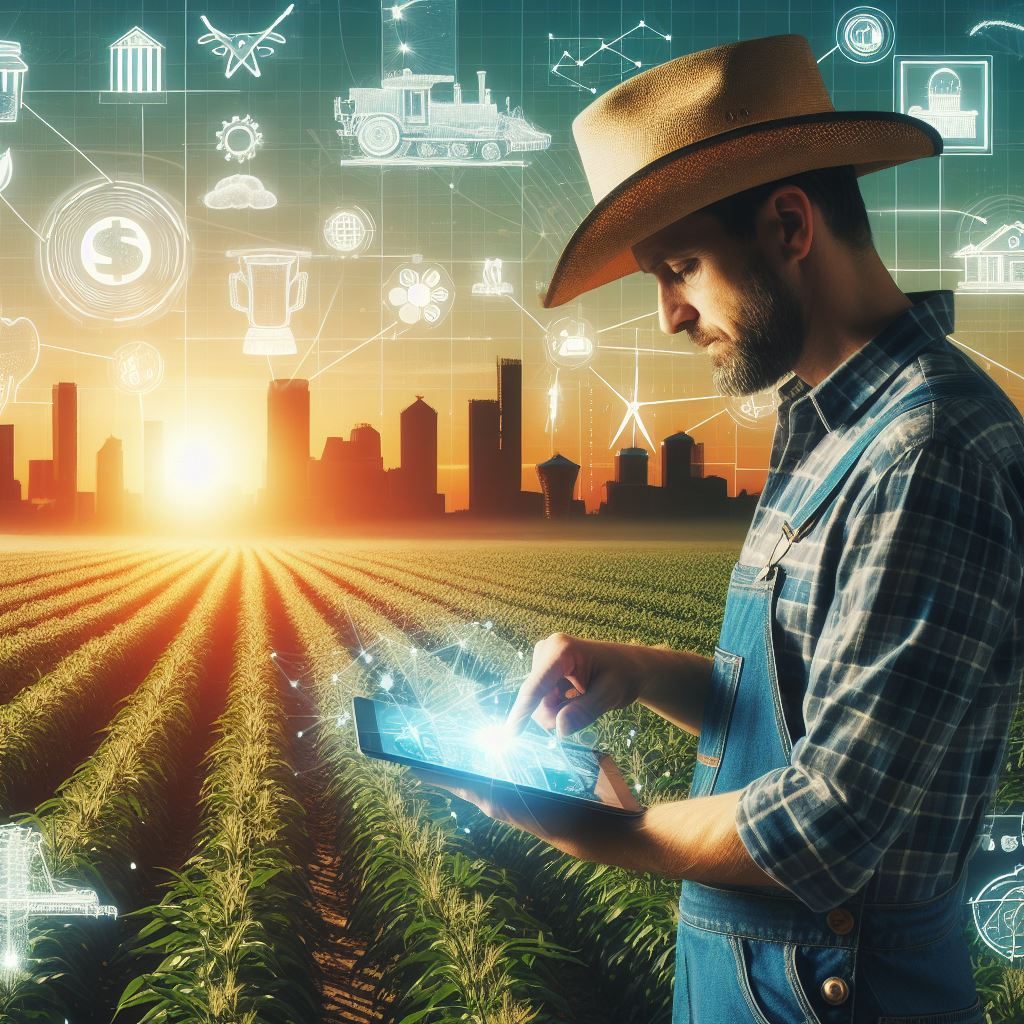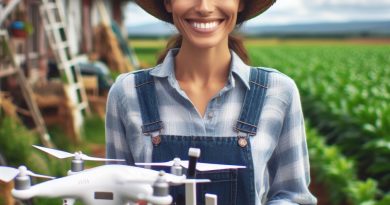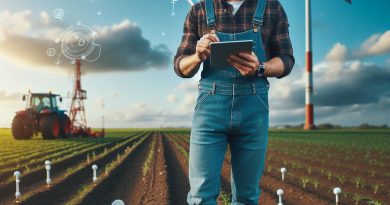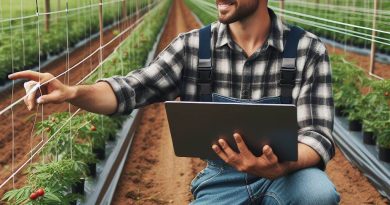Big Data’s Role in Future Farming
Last Updated on January 20, 2024
Introduction
The role of Big Data in farming has the potential to revolutionize the agricultural landscape.
With the emergence of advanced technologies and the Internet of Things, farmers now have access to an unprecedented amount of data that can greatly enhance their decision-making process and improve overall efficiency.
Overview of the importance and relevance of the topic
This blog post explores the role of Big Data in future farming and highlights its importance and relevance in the agricultural industry.
By harnessing the power of data analytics and predictive modeling, farmers can optimize crop yields, monitor livestock health, manage resources more effectively, and make informed decisions to ensure sustainable agricultural practices.
The use of sensors, drones, satellite imagery, and other smart farming technologies enables the collection of real-time data, which is then analyzed to provide valuable insights and actionable recommendations.
Farmers can gather information about weather patterns, soil conditions, crop growth, and pest infestations, among other things, to make timely interventions and mitigate potential risks.
The integration of Big Data in farming not only increases productivity and profitability but also helps in the preservation of natural resources and biodiversity.
Moreover, Big Data can facilitate farm-to-market traceability, allowing consumers to have a transparent view of the entire food supply chain.
As the global population continues to grow, the demand for food will increase, making it crucial for farmers to adopt smart farming practices powered by Big Data to ensure a sustainable and secure future.
Definition and Explanation of Big Data
Big Data refers to the large and complex sets of information that cannot be effectively managed and analyzed using traditional data processing techniques.
It encompasses structured, semi-structured, and unstructured data from various sources.
Define the concept of “Big Data” and its relevance to farming
In the context of farming, Big Data refers to the massive amount of data generated through various sources such as weather sensors, machine readings, crop yields, soil quality, and market trends.
This data is crucial for making informed decisions and optimizing farming practices.
How Big Data is generated in the agricultural sector
Big Data in agriculture is generated through multiple sources, including IoT devices, satellite imagery, drones, and farm machinery equipped with sensors.
These technologies collect data on factors like temperature, humidity, soil moisture, crop growth, and pest infestations.
Significance of Big Data in providing valuable insights for farmers
Big Data plays a pivotal role in transforming the farming industry, providing farmers with valuable insights and actionable information.
Here are some key advantages:
Precision farming
By analyzing Big Data, farmers can optimize the use of resources such as water, fertilizers, and pesticides.
They can identify areas within their fields that require specific interventions, leading to better crop yields and cost savings.
Enhanced decision-making
Big Data analytics enables farmers to make data-driven decisions by analyzing historical data, weather patterns, market trends, and crop performance.
It helps them choose suitable crops, predict yields, and determine the most profitable farming practices.
Pest and disease management
By continuously monitoring the data collected by sensors, farmers can detect early signs of pest infestations or diseases.
This allows for timely interventions, preventing the spread and minimizing crop damage.
Forecasting and risk management
Big Data analytics can help farmers anticipate risks such as extreme weather events, market fluctuations, or disease outbreaks.
Such insights enable them to take preventive measures and reduce potential losses.
Market insights and supply chain optimization
Analyzing Big Data helps farmers gain insights into consumer preferences, market demands, and price forecasts.
This information can guide their production decisions, improve supply chain efficiency, and ensure better profitability.
Sustainable practices
Big Data enables farmers to adopt more sustainable practices.
By analyzing environmental data, they can optimize irrigation, minimize water usage, reduce soil erosion, and implement environmentally friendly approaches.
Generally, Big Data has emerged as a game-changer in the farming industry.
Its ability to capture, analyze, and interpret vast amounts of data provides farmers with crucial insights to enhance productivity, reduce costs, and make informed decisions.
By leveraging Big Data, farmers can not only improve their yields but also contribute to sustainable and efficient agricultural practices.
Read: Agri-Tech and Big Data: Transforming Farm Management
Benefits of Big Data in Farming
Big Data has emerged as a powerful tool that can revolutionize various aspects of farming operations.
By harnessing the vast amount of data generated in the agriculture industry, farmers can optimize their practices, improve yields, and make the most efficient use of resources.
Here are some key areas where Big Data can have a significant impact:
Precision Agriculture: Using data to apply resources more efficiently
One of the major benefits of Big Data in farming is the ability to practice precision agriculture.
This involves using data collected from sensors, satellites, and drones to precisely target the application of resources like fertilizers, pesticides, and irrigation.
By understanding the specific needs of different areas within a field, farmers can minimize waste and increase the effectiveness of their inputs.
For example, by analyzing soil moisture data, farmers can determine which areas require additional irrigation and avoid overwatering in other areas.
This not only conserves water but also prevents unnecessary leaching of nutrients and reduces the risk of crop diseases.
Crop Management: Monitoring and analyzing data for improved yields
Big Data analytics can play a crucial role in crop management by monitoring and analyzing various parameters that affect crop health and productivity.
Sensors can collect data on soil moisture, temperature, humidity, and nutrient levels, allowing farmers to make informed decisions on fertilization, pest control, and harvesting.
By continuously monitoring crop growth and environmental conditions, farmers can identify patterns and trends that can help optimize their practices.
For example, by analyzing weather data, farmers can predict the onset of pests or diseases and take timely preventive measures.
This not only improves yields but also reduces the reliance on chemical inputs, making farming more sustainable.
Livestock Management: Using data to enhance animal health and productivity
In addition to crop management, Big Data can also revolutionize livestock management.
By monitoring parameters like milk production, weight gain, feeding patterns, and health records, farmers can ensure the well-being and productivity of their animals.
For instance, wearable devices and sensors can collect real-time data on the heart rate, temperature, and activity levels of animals.
This information can be analyzed to detect early signs of illness or stress, allowing farmers to provide timely interventions and prevent disease outbreaks.
Supply Chain Optimization: Utilizing data to streamline logistics and reduce waste
Another significant benefit of Big Data in farming is supply chain optimization.
By collecting data on the movement of goods, transportation conditions, market demand, and environmental factors, farmers can streamline their logistics operations, reduce waste, and ensure timely delivery of fresh produce.
For example, by analyzing data on transportation routes and vehicle capacity, farmers can optimize their delivery schedules and minimize fuel consumption.
This not only reduces costs but also reduces carbon emissions, making the entire food supply chain more sustainable.
Big Data has the potential to revolutionize the farming industry by optimizing various operations and improving overall efficiency.
From precision agriculture to crop and livestock management, and supply chain optimization, the benefits of leveraging data are immense.
By embracing Big Data, farmers can achieve higher yields, reduce waste, enhance animal health, and contribute to a more sustainable future.
Read: Data Analytics in Modern Farming
Challenges and Limitations of Big Data in Farming
Despite the promise and potential benefits that Big Data offers for the future of farming, there are several challenges and limitations that need to be addressed in order to fully realize its value.
Data collection and privacy
One of the main concerns is data collection and privacy.
Farmers may be hesitant to share sensitive information about their operations, fearing that it could be misused or compromised.
To overcome this barrier, clear protocols on data ownership and privacy need to be established. Farmers should have control over their data and decide who can access it.
Technical infrastructure requirements
Another challenge lies in the technical infrastructure requirements.
While Big Data solutions offer valuable insights, they rely on advanced technology and reliable internet connectivity.
Many small-scale farmers may not have the necessary resources to invest in such infrastructure.
Efforts should be made to provide affordable access to these technologies and ensure reliable internet connectivity in rural areas.
Access and affordability
Access and affordability are significant issues for small-scale farmers.
Implementing Big Data technologies can be costly, limiting access for farmers with limited financial resources.
Moreover, training and education on how to effectively use data-driven tools may be lacking in the farming community.
To address these concerns, initiatives should be taken to make Big Data solutions accessible and affordable to all farmers, regardless of scale.
Analyzing and interpreting large datasets effectively
Analyzing and interpreting large datasets effectively is another challenge.
Handling massive amounts of data can be overwhelming, and farmers may lack the analytical skills required to make sense of the data and make informed decisions.
Offering specialized training and support to farmers can help them utilize Big Data effectively and maximize its potential benefits.
Essentially, while Big Data holds great promise for the future of farming, there are challenges and limitations that need to be overcome.
Addressing data collection and privacy concerns, ensuring access to necessary infrastructure, promoting affordability, and providing training and support are key steps towards harnessing the full potential of Big Data in agriculture.
By overcoming these barriers, farmers can benefit from data-driven insights and make informed decisions to optimize their operations and improve productivity.
Read: Elevating Agriculture with Drone Innovations

Successful Case Studies and Examples
Example 1: Increased crop yields through data-driven decision-making
Big Data has revolutionized farming by enabling farmers to make data-driven decisions, resulting in increased crop yields.
By analyzing data such as weather patterns, crop health, soil conditions, and historical yield data, farmers can optimize their farming practices for maximum productivity.
They can adjust irrigation schedules, fertilizer applications, and pest control measures based on data insights, ensuring that crops receive the right resources at the right time.
This has led to significant improvements in crop yields, reducing waste and increasing profitability.
Example 2: Improved livestock health and productivity with sensor data
Another notable success story where Big Data has revolutionized farming is in the livestock industry.
By leveraging sensor data, farmers can monitor the health and well-being of their animals in real-time.
Sensors attached to animals can collect data on their heart rate, body temperature, and movement patterns, providing valuable insights into their health and behavior.
This data is then analyzed using advanced algorithms, enabling early detection of health issues and improved disease management.
As a result, farmers can promptly intervene and provide necessary care, leading to improved livestock health and productivity.
Example 3: Enhanced supply chain efficiency and traceability with data analytics
Big Data analytics has also transformed the agricultural supply chain, improving efficiency and traceability.
Through the use of data analytics tools, farmers and other stakeholders can track and monitor every step of the supply chain, from production to distribution.
By collecting and analyzing data on factors like transportation routes, storage conditions, and product demand, farmers can optimize their logistics, reduce wastage, and ensure fresher products reach the market.
Additionally, consumers can also trace the origin and quality of agricultural products, building trust and promoting transparency in the industry.
These three examples highlight the transformative power of Big Data in farming.
By harnessing the power of data, farmers can make informed decisions, improve crop yields, enhance livestock health, and streamline supply chain operations.
Challenges with Big Data
However, the successful implementation of Big Data in farming requires overcoming certain challenges.
Data collection
One challenge is data collection.
Farming generates vast amounts of data, such as satellite imagery, weather data, crop-specific metrics, and livestock monitoring data.
Gathering, storing, and managing this data can be complex and require efficient systems and infrastructure.
Data analysis and interpretation
Another challenge is data analysis and interpretation.
Transforming raw data into actionable insights requires advanced analytics tools and expertise.
Farmers need to invest in technologies that can process and analyze data quickly, accurately, and at scale.
This may require collaborations between farmers, data scientists, and technology providers.
Data privacy and security
Furthermore, there is a need for data privacy and security.
As farmers collect and share more data, there is a risk of unauthorized access or misuse of sensitive information.
Robust data protection measures, such as encryption and access controls, must be implemented to safeguard farmers’ data and maintain trust among stakeholders.
In general, Big Data’s role in future farming is increasingly significant.
Successful case studies and examples demonstrate how data-driven decision-making can revolutionize farming practices.
Increased crop yields, improved livestock health, and enhanced supply chain efficiency are just a few of the benefits that Big Data brings to the agricultural sector.
However, challenges related to data collection, analysis, and security must be addressed to fully harness the potential of Big Data in farming.
With continued advancements in technology and collaborations between farmers, researchers, and industry experts, the future of farming looks promising with Big Data as a powerful tool for transformation.
Read: Sustainable Farming: How Agri-Tech is Helping
Future Implications and Innovations
Advancements in technology continue to revolutionize the agriculture industry, and one area that holds immense potential is the use of Big Data.
As farms become increasingly connected and data-driven, the possibilities for improving efficiency and productivity are endless.
Here, we explore some of the future implications and innovations of Big Data in farming.
Artificial Intelligence and Machine Learning Applications
By harnessing the power of artificial intelligence (AI) and machine learning (ML), farmers can unlock valuable insights from vast amounts of data.
AI algorithms can analyze historical data and make predictions about crop yields, pest outbreaks, and weather patterns.
This enables farmers to make data-driven decisions, optimize resource allocation, and prevent potential losses.
Internet of Things (IoT) Integration for Real-Time Data Collection
The integration of Internet of Things (IoT) devices within farming operations allows for real-time data collection and monitoring.
Sensors embedded in fields can gather information about soil moisture levels, temperature, and nutrient composition.
This data can be relayed wirelessly to farmers’ devices, empowering them to respond quickly to changing conditions and optimize irrigation and fertilization practices.
Data-Driven Predictive Models for More Accurate Crop Yield Forecasting
Big Data analytics, combined with weather data, satellite imagery, and soil analysis, can give rise to highly accurate crop yield forecasts.
By utilizing historical data and modeling techniques, farmers can predict yields with greater precision.
This helps them plan ahead, optimize logistics, and efficiently meet market demands.
Collaborative Platforms for Sharing Agricultural Data and Knowledge
The future of farming lies in collaboration and knowledge sharing.
Big Data enables the creation of collaborative platforms where farmers, researchers, and agronomists from around the world can pool their data and expertise.
This collective intelligence fosters innovation, promotes sustainable practices, and accelerates problem-solving within the industry.
These platforms also serve as repositories of valuable agricultural knowledge, helping farmers access best practices, learn from each other’s experiences, and stay informed about the latest research.
By breaking down information silos, farmers can make more informed decisions and adopt data-driven strategies that lead to improved outcomes.
In essence, the future of farming is bound to be shaped by Big Data.
From AI-powered predictive models to real-time IoT data collection, the implications for the industry are immense.
As farmers increasingly embrace these innovations, they can expect greater precision, efficiency, and sustainability in their operations.
However, as with any technological advancement, challenges must be addressed.
Issues related to data privacy, data security, and reliable connectivity need to be resolved to ensure the widespread adoption and responsible use of Big Data in agriculture.
Overall, the potential benefits of Big Data in farming are enormous.
By leveraging data-driven insights and collaborative platforms, farmers can stay ahead of the curve, optimize resource allocation, and contribute to a more sustainable and productive future for agriculture.
Conclusion
Main points discussed in the blog post
Big Data has the potential to revolutionize the farming industry.
It offers farmers the ability to make data-driven decisions, optimize their operations, and improve efficiency.
By harnessing the power of Big Data, farmers can access valuable insights and predictive analytics that can help them mitigate risks, increase yields, and reduce costs.
The integration of IoT devices, drones, and satellite imagery enables real-time monitoring of crops, weather patterns, and soil conditions, allowing farmers to proactively respond to changes.
Furthermore, Big Data can drive sustainable farming practices by optimizing resource allocation and minimizing environmental impact.
It opens up opportunities for precision agriculture, smart irrigation systems, and precision application of fertilizers and pesticides.
Encouragement for readers to explore and embrace the opportunities presented by Big Data in agriculture
As we move towards the future, embracing Big Data in agriculture is crucial for addressing food security challenges and feeding the growing global population.
Through collaboration with data scientists, agribusinesses, and stakeholders, we can unlock the full potential of Big Data in shaping the future of farming.
By adopting and leveraging such technologies, farmers can enhance productivity, profitability, and sustainability.
It is important for individuals and organizations to explore and embrace the opportunities presented by Big Data in agriculture, as it holds the key to transforming the way we produce food and contribute to a more resilient and efficient agricultural sector.


